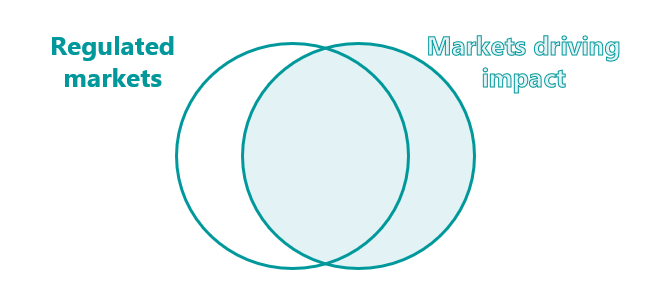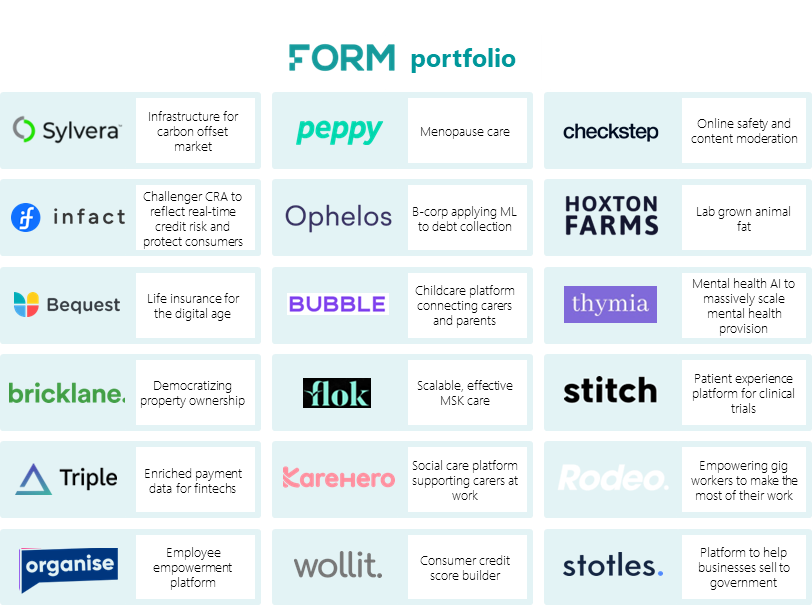We’ve always wanted to explain in public how we at Form think about the impact of our work. In advance of SDR rules coming in later this year, and with their influence on terms like ‘impact’ still taking shape, we’re taking the opportunity to do so.
We chose to call ourselves a regulated market fund, rather than an impact fund. But just because we don’t have “impact” above the door, doesn’t mean we don’t care about having a positive impact.
Founders should always ask the potential investors what they stand for. For us, our answer is simple: our mission is to back founders building the future of regulated markets — and more than just this, a future we are proud of. We want to do good, and we have core beliefs about our thesis that all point towards our work having an overwhelmingly positive impact on the world.
So here’s a little explainer about our core beliefs on how Form has a positive impact.
What we believe about our impact
Regulated markets are regulated because they matter to people
But regulated markets can grow stale. Startups disrupt them to make them work better & improve outcomes
Our work — investing in and helping startups to move quickly, and helping regulators to upgrade their support for innovation today — is critical to delivering impact in the long run
1. Regulated markets are regulated because they matter to people
Regulation has a bunch of different purposes. Broadly, it is be aimed at protecting/ benefiting people, businesses and the environment, including through economic growth. Taking that one level higher, markets like financial services, healthcare, energy, water — they’re regulated because the outcomes in those markets really matter to governments, because they really matter to people. There are regulated markets that are regulated because the product has been demonstrated to harm consumers — e.g. tobacco — but the overwhelming majority of regulated markets involve products or services that are somehow positively valuable to consumers.
2. But regulated markets can grow stale. Startups disrupt them to make them work better & improve outcomes
In our experience, startups are almost always disrupting these markets in a way that will improve outcomes for the end user. They are generally aiming to 10x some part of a service or product — e.g. making it 10x cheaper (thereby increasing access) or 10x better.
Our portfolio makes this abundantly clear. Take Peppy, Flok or Stitch in healthcare; or Infact, Ophelos, or Triple in fintech; or Sylvera in carbon offsetting - snapshot below.
While we fully believe that the overwhelming majority of startups (and our portfolio in particular) are trying to improve outcomes for consumers in regulated markets, there are three categories which require a more considered approach:
Short term pain for long term gain: The market shift caused by new entrants can be short-term painful. We firmly believe that startups disrupting regulated markets promise better outcomes for consumers, but the pathway there can add friction as the market adjusts to the new normal. There are plenty of examples of this: e.g. primary care reimbursement not adapting quickly to new models like Babylon that separate geography from service delivery, or Airbnb bringing trust to global travel, yet causing challenges for local housing and accommodation markets. The disruption is real, but the long term benefit is clear. We don’t believe the alternative — protecting a status quo which is often broken in other ways — is a better route to impact.
Straightforwardly negative: There are occasions where we think the disruption caused by a startup will have net negative effects on the end consumer, and in those cases we do not pursue the investment.
Taboo markets: There are also markets that some investors view as almost intrinsically negative and therefore steer clear — like taboo markets e.g. debt collection or security. But we still think the right teams/ projects can have enormous benefits there. We take a case-by-case approach to understanding how companies in these spaces will change markets, always asking “will this company have a net positive impact on people’s lives?”
3. Our work — investing in and helping startups to move quickly, and helping regulators to upgrade their support for innovation today — is critical to delivering impact in the long run
We spend a lot of time with policy-makers and regulators. Yes, we’re trying to help our portfolio move as quickly as possible in regulated settings, but we also think that requires overall improvement in how government treats startups/disruption/innovation more broadly. We’ll only build global winners in regulated markets if our policy-makers and regulators collaborate with startups to help them get there - and we’ve always seen it as part of our role in the market to help bridge that gap.
Our recent “Fix The Regulators” campaign is a great example of this — where we set out the level of ambition, funding, and risk tolerance needed in the UK’s regulators if we are to protect the UK’s role as a global startup hub.
We have utmost conviction that London, as one of the only western capitals that is both a leading startup hub and the centre of all policy-making, has a great opportunity to have the most pro innovation regulatory system in the world. That will mean we can all benefit from startup-driven improvements before everyone else, in a safe way. We see it as our role to help the UK get there.





